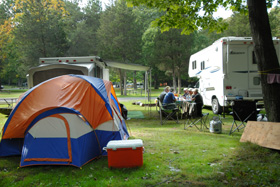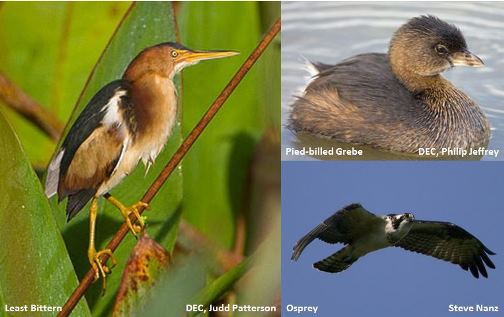Selkirk Shores State Park

7101 State Route #3
Pulaski, NY 13142
- General Information: (315) 298-5737

In addition to spectacular sunsets over one of the Great Lakes, visitors to Selkirk Shores State Park can expect outstanding fishing and popular hiking and biking trails that lead to a lush mix of meadows and woodlands.
Take full advantage of the views! Bring your binoculars - the park is directly in the migration route for a wide variety of bird species. Or, pitch a tent and stay awhile. Campsites are available directly overlooking a bluff on Lake Ontario.
Small boats can be launched from the Pine Grove site into the Salmon River, while larger boats can be launched from the Mexico Point Boat Launch on the Little Salmon River.
Day Use Information
Selkirk Shores has two pavilions. Prices range from $100 to $200 and can accommodate 100 or 200 people. Check availability at ReserveAmerica.com
Pet Policy: A maximum of two pets are allowed in campsites and day use areas unless prohibited by sign or directive. Pets are to be supervised at all times and either be crated or on a leash not more than 6-feet in length. Proof of rabies inoculation shall be produced if requested by staff. Pets are not permitted in playgrounds, buildings, golf courses, boardwalks, pools and spray-grounds or guarded beaches (this does not apply to service animals).
Hours of Operation
- Park is open year-round, sunrise - sunset.
- Beach/Swimming 2025:Beach opens from June 14th to August 31st at Selkirk Shores for Friday, Saturday, and Sundays only, 11am-7pm.
- Boating: Direct access to a lake is available for launching personal non-motorized boats. Trailers are not permitted.
Camping Season: Currently closed for the season.
Campsites - 132 Campsites, maximum 6 people per site.
Cabins - 24 Cabins (Minimum age of 21 required for rentals)
*Please note within the camping season time frame, some loops/sites may open later or close earlier. For more details, please call the park or visit
Reserve through ReserveAmerica 800-456-2267
http://www.newyorkstateparks.reserveamerica.com- Hunting: Archery only; Call park for details.
- Park Office Hours: Summer office hours will be 7am-3:30pm Monday-Thursday and 7am-7pm on Friday, Saturday, and Sunday starting June 14th (once the beach opens for the season)
- Rec Hall:
Closed for 2025 season. - Shelter Rentals:Closed until further notice.
Enclosed Shelter, capacity 299
Open Shelter, capacity 100
Fees & Rates
Most New York State Parks charge a vehicle use fee to enter the facility. Fees vary by location and season. A list of entry fees and other park use fees is available below. For fees not listed or to verify information, please contact the park directly.
The easy-to-use Empire Pass card is $80- and your key to all-season enjoyment with unlimited day-use entry at most facilities operated by State Parks and the State Dept. of Environmental Conservation including forests, beaches, trails and more. Purchase online or contact your favorite park for more information. Learn more about our Admission Programs including the Empire Pass.
- Camping:
- Campsites:
$24-$31.25/night
Additional $5/night for non-NYS residents
Cabins:
$434-$672/week
daily rate is 1/4 the weekly charge
Additional $28/week for non-NYS residents
Additional $7/night for non-NYS residents
*Minimum age of 21 required for rentals
Maps

New! Download this park's digital map to your iOS Apple and Android device.
Firewood source maps show a 50-mile radius from which untreated firewood may be moved to this campground. For more information see firewood restrictions.
Highlights of Selkirk Shores State Park:
- Two rivers flow into Lake Ontario through Selkirk Shores State Park. The Salmon River flows along the north end of the park and Grindstone Creek along the south end. Both of these rivers form distinctive natural communities.
- The Salmon River just north of the park offers world class salmon and steelhead fishing.
- A portion of the wooded area between the campground and the Enclosed Shelter is considered original old growth forest, as it has never been harvested.
- The Selkirk Shores Bird Conservation Area supports populations that are associated with marshes, forests, and shrubs. This area protects marsh-dwelling birds such as Pied-billed Grebes (threatened), American Bitterns (special concern), Least Bitterns (threatened), Black Terns (endangered), as well as other birds.
- Selkirk Shores State Park encompasses part of the Eastern Lake Ontario Dune and Wetland System, an irreplaceable natural area consisting of beaches, dunes, wetlands, wetlands and embayments. These areas form a coastal barrier protecting inland areas, both natural habitats and human structures, from the direct effect of Lake Ontario's waves, currents, and high water. The coastal barrier is especially important to maintaining the natural productivity of the coastal environment and in providing habitats for fish and wildlife.
- The area contains some of the highest quality freshwater marshes in New York State. In addition to state parks, the entire Eastern Lake Ontario Wetland complex has been deemed a "significant coastal fish and wildlife habitat" but the Department of State, an Audubon "Important Bird Area," a New York State "Bird Conservation Area," and a "National Natural Landmark."
What will you see? Plan your visit today!
Look and listen for these birds at our Park:
Everyone is a Steward: Be a Selkirk Shores State Park Hero!
-
Know the rules and concerns for the area you'll be visiting.
-
Leave rocks, plants and other natural objects as you find them.
-
Let nature's sounds prevail. Avoid loud voices and noises.
-
Respect other visitors and protect the quality of their experience. Be courteous. Yield to other users on the trail.
-
Observe wildlife from a distance. Do not follow or approach them. Never feed animals. Feeding wildlife damages their health, alters natural behaviors, and exposes them to predators and other dangers
-
Use extra caution when using headphones. You may not be able to hear warnings.
-
Don't litter.
-
Hike and camp on established, durable trails and campsites.
For more information, please read our Trail Tips!
When you enter or leave Lake Ontario:
-
Clean and remove all visible plants, animals, fish and mud from your boat, trailer and other equipment and dispose of it in a suitable trash container or on dry land.
-
Drain water from bilge, live wells, ballast tanks and any other locations with water before leaving the launch. Disinfect when possible.
-
Dry your boat, trailer and all equipment completely. At least 5 days of drying time is recommended. Drying times vary depending on weather and material.
Ask a Naturalist!
Q: Are the snakes on the Lake shore and in the creek venomous?
A: No! The snakes are most likely to be garter snakes, one of the most frequently seen snakes in New York. Garter snakes are harmless, though you should always keep your distance from wildlife.
Q: Are the snakes by the water cotton mouths or copper heads?
A: No, they are most likely non-venomous northern water snakes. However, they can be aggressive and should be avoided.
Q: Are there any invasive species at Selkirk Shores State Park?
A: Unfortunately, yes. Purple loosestrife (Lythrum salicaria), frog's bit (Hydrocharis morsus-ranae) and forget-me-not (Myositis scorpiodes) are all exotic species which can be found in the park. These plants threaten marsh communities because they replace native plants and may be filling in the small pools that some birds use for nesting.
DID YOU KNOW?
Fish:
-
Salmon born in the rivers around Selkirk Shores State Park spend their adulthood feeding and growing in Lake Ontario. After around four years, the salmon return to spawn in the rivers where they were. The majority of salmon die after their first spawning.
-
There are two types of steelhead trout that run up some of Lake Ontario's tributaries? The Skamania run from May into September and the Washington steelhead run mid-September through February. Both spawn in late March to the end of April and then return to the Lake.
History:
-
A large portion of the park was once a potato farm. After the land was made into a park, most of the farm land was planted with trees.
-
The log structures and the cabins were built by the Civilian Conservation Corps (CCC) in the 1930s and '40s. Many are made from American chestnut trees felled during the early years of the chestnut blight.
The Central Region Environmental Education Team offers a variety of programs in our parks. Each park offers their own free public programs.
We also offer guided programs for groups (of 10 or more) and field trips. Please email Environmental Education Team (Ladders@parks.ny.gov), We offer several program topics to choose from, but if you don't see what you are looking for let us know. We are working on adding to our lesson plans and will gladly create something teachers request, if time permits.
Selkirk Shores State Park: Located on the shores of Lake Ontario makes this the perfect place to learn about watersheds, water quality, and current issues like micro-plastics. Many schools incorporate beach clean-ups and nature walks to the nearby frog pond into their field trips.
Connect Kids to State Parks Field Trip Grants: Looking for ways to make field trips more affordable? Our Connect Kids to Parks Transportation Reimbursement Grants cover most of the costs associated with a field trip to state lands; including busing, entrance and program fees, or contracting for special programs

Key BCA Criteria:
- Migratory concentration site
- Diverse species concentration site
- Species at risk site
The Selkirk Shores BCA is part of Selkirk Shores State Park. It is located on Lake Ontario about 0.3 miles south of Port Ontario, which helps it support New York State species at risk. During spring migration Neotropical migratory songbirds concentrate along lake. The BCA supports assemblages of birds associated with marshes, forests and shrub/scrub including more than 80 species that have been confirmed as breeders. The BCA has supported at risk breeding marsh birds such as Pied-billed Grebes (threatened), American (special concern) and Least Bitterns (threatened), and Black Terns (endangered). Other regularly occurring species at risk include Osprey (special concern), Sharp-shinned Hawk (special concern), Common Tern (threatened) and Golden-winged Warbler (special concern).
Download a copy of the BCA map.
Attention Hunters: Highly Pathogenic Avian Influenza (i.e., "bird flu") has recently been detected in New York State in a variety of waterfowl species. Although the NYS Department of Health (NYSDOH) has stated that avian influenza rarely spreads to humans, the New York State Department of Environmental Conservation (NYSDEC) is encouraging hunters to take extra precautions while processing harvested waterfowl. For more information on best practices for hunters to minimize risk of exposure, please read NYSDEC Highly Pathogenic Avian Influenza - What Hunters Need to Know (leaves State Parks website).
For general information on Avian Influenza, please see: Cornell University, College of Veterinary Medicine - Avian Influenza Fact Sheet (leaves State Parks website).
For additional updates on Avian Influenza, including current updates, see NYSDEC - Animal Diseases (leaves State Parks website) and NYSDOH - Questions and Answers about Avian Influenza (Bird Flu) (leaves State Parks website).
Hunting PermitAmenities Information
- Amenities
- Biking
- Boat Launches
- Camper Assistance Program
- Campsites, Cabins & Lodging
- Fishing
- Food
- Hiking
- Hunting
- Pavilions and Shelter Rentals
- Playgrounds
- Showers (Accessible)
- Snowmobiling
- Snowshoeing/X-Country Skiing
- Swimming Beach
- Resources
- Selkirk Shores State Park
